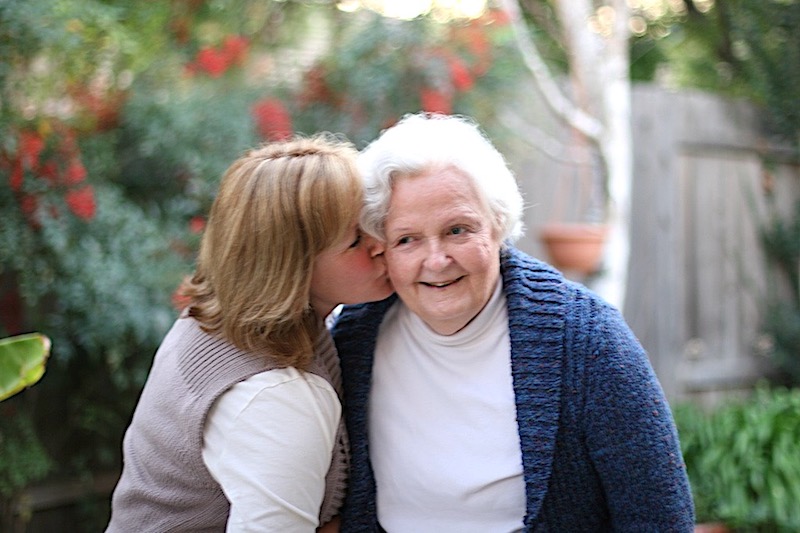“Alzheimer’s is about the present and the struggle, the scrappy brawl, the fight to live with a disease. It’s being in the present, the relationships, the experiences, which is the core of life, the courage to live in the soul.” –Greg O’Brien
November is Alzheimer’s Awareness month, a time to heighten awareness about Alzheimer’s disease and show support for the more than 6.2 million Americans living with it.
Millions of Americans are living with Alzheimer’s or other dementias. As the size of the U.S. population aged 65 and older continues to grow, so will the number and proportion of Americans with Alzheimer’s or other dementias.
That number is expected to nearly triple by 2050. Tens of millions more will experience other forms of dementia, and 75% of older adults will suffer from memory problems.
Watching a loved one suffering from the progressive effects of Alzheimer’s disease or another form of dementia can be distressing for family members who worry about their loved one’s safety, daily care needs, and overall well-being as symptoms progress.
My mother died of complications related to Alzheimer’s disease. It was heart-wrenching for my sisters and me to watch a bright, intelligent woman succumb to the gradual decline of the disease over 20 years.
I have to admit; I knew nothing of the complications of Alzheimer’s disease. Living several hours away from my mother, I sadly didn’t realize the severity of her condition as she sank deeper into the disease.
In this Blog, I will highlight the role of degenerative complications related to Alzheimer’s and dementia and what to look out for. I will also highlight the supportive role that aromatherapy may play in brain health, cognitive function, and overall wellness as we age or if dementia has already begun.
Dementia Awareness
Dementia is an umbrella term that includes memory loss. Alzheimer’s disease is the most common form of dementia, occurring in 60% of individuals with cognitive decline. The most common cause of dementia in seniors over 65 years old has been researched extensively, and aromatherapy can be of great help.
Dementia is a general category for degenerative brain diseases that affect essential brain functions and cause memory loss, cognitive impairment, and personality and behavior changes.
We know that memory issues are related to a cluster of neurologic or medical conditions affecting everyday communication, memory recall and retention, socialization, decision-making, and critical or logical thinking.
Memory loss is a distressing part of dementia for the person with the condition and those around them. Dementia occurs when brain nerve cells become damaged. Various types of dementias are often categorized by the part of the brain affected and how quickly the condition worsens.
The neurons damaged first are those in parts of the brain responsible for memory, language, and thinking. As a result, the first symptoms of Alzheimer’s disease tend to be memory, language, and thinking problems.
Although these symptoms are new to the individual affected, the brain changes that cause them are thought to begin 20 years or more before symptoms start. Individuals with mild symptoms of dementia often may continue to work, drive, and participate in their favorite activities, with occasional help from family members and friends.
Learning everything you can about dementia and degenerative complications of Alzheimer’s may make it easier to put things into perspective and what to expect from the day-to-day challenges of caring for a loved one.
Alzheimer’s Disease
Alzheimer’s is a syndrome. It is a progressive brain disease not part of healthy aging. AD can negatively impact work, relationships, decision-making, independent living, behavior changes, and personality.
Alzheimer’s disease is progressive, meaning it worsens with time. How quickly it progresses and what abilities are affected vary from person to person. It typically progresses slowly in three general stages: early, middle and late (sometimes referred to as mild, moderate, and severe in a medical context).
 Since Alzheimer’s affects people in different ways, each person may experience symptoms — or progress through the stages — differently. Treatments target symptoms but don’t change the course of the disease. Flower Essence Aromatherapy may help slow the severity of symptoms during all stages.
Since Alzheimer’s affects people in different ways, each person may experience symptoms — or progress through the stages — differently. Treatments target symptoms but don’t change the course of the disease. Flower Essence Aromatherapy may help slow the severity of symptoms during all stages.
Early Stages of Alzheimer’s Disease
Alzheimer’s is frequently misdiagnosed, especially in the early stages. Other illnesses, including depression, can have similar symptoms and require other treatments.
In the early stage of Alzheimer’s, a person may function independently. They may still drive, work, and participate in social activities. Despite this, the person may feel like they are having memory lapses, such as forgetting familiar words or the location of everyday objects. Symptoms usually start mild and include time, orientation, and place loss.
- Memory loss and forgetfulness (a person may forget where they have left items such as their keys).
- Many struggles with finding the right words during conversations, repeating themselves, or forgetting people’s names.
- Get lost in a familiar place.
- Have difficulty with spacial awareness.
- Have difficulty making decisions or following a sequence of tasks.
During the early stage, people with dementia can live well by taking control of their health and wellness and focusing their energy on aspects of their life that are most meaningful to them. Aromatherapy to slow progression at this stage is very effective.
In addition, this is the ideal time to put legal, financial, and end-of-life plans in place because the person with dementia will be able to participate in decision-making.
Middle-stage Alzheimer’s Disease
Middle-stage Alzheimer’s is typically the longest and can last many years. As the disease progresses, the person living with Alzheimer’s will require greater care.
During this stage, the person may confuse words, get frustrated or angry, and act unexpectedly, such as refusing to bathe. Damage to nerve cells in the brain can also make it difficult for the person to express thoughts and perform routine tasks without assistance. Symptoms, which vary from person to person, may include:
- Being forgetful of events or personal history.
- Feeling moody or withdrawn, especially in socially or mentally challenging situations.
- Being unable to recall information about themselves, like their address or telephone number, and the high school or college they attended.
- Experiencing confusion about where they are or what day it is.
- Requiring help choosing proper clothing for the season or the occasion.
- Having trouble controlling their bladder and bowels.
- Experiencing changes in sleep patterns, such as sleeping during the day and becoming restless at night.
- They are showing an increased tendency to wander and become lost.
- Demonstrating personality and behavioral changes, including suspiciousness and delusions or compulsive, repetitive behavior like hand-wringing or tissue shredding.
In the middle stage, the person living with Alzheimer’s can still participate in daily activities with assistance. As the need for more intensive care increases, caregivers may want to consider respite care or an adult day center to receive care in a safe environment.
Later Stages of Alzheimer’s Disease
In the final stage of the disease, individuals lose the ability to respond to their environment, carry on a conversation, and, eventually, control movement. They may still say words or phrases, but communicating pain becomes difficult. As memory and cognitive skills further decline, personality changes may occur, and individuals need extensive care.
- Severe loss of memory, communication, reasoning, and orientation.
- May become delusional and suffer from hallucinations.
- May become aggressive or agitated.
- Experience changes in physical abilities, including walking, sitting, and swallowing.
- They generally become less aware of what is happening around them, becoming trailer.
- Become vulnerable to infections, especially pneumonia.
The person living with Alzheimer’s may not be able to initiate engagement as much during the late stage. However, they can still benefit from caring, loving interaction in appropriate ways, like listening to relaxing music or receiving reassurance through gentle touch.
During this stage, focus on providing comfort and dignity at the end of life. Hospice can significantly benefit people in the final stages of Alzheimer’s and other dementias and their families.
Degenerative Complications
As Alzheimer’s progresses, individuals commonly experience multiple types of symptoms that change with time. These symptoms reflect the degree of damage to neurons in different brain parts. The pace at which signs of dementia advance from mild to moderate to severe differs from person to person.
My mother exhibited all the classic complications related to the gradual progression of AD. Her journey was agonizing, especially in the beginning stage of the disease, when she recognized that something was wrong. Later, in her journey, when complication factors related to the disease became more pronounced, it became clear that we were over our heads and major decisions had to be made for her safety.
Some facts you may not know about Alzheimer’s complications include
Agitation and Anxiousness
People diagnosed with AD commonly have periods of agitation and anxiousness. As my mother’s forgetfulness increased, she became afraid. Her ability to reason and understand her inability to make sense of her condition sadly exasperated her confused, fearful, anxious, and agitated mind.
Mood & Behavioral Changes
Besides memory decline, my mother’s mood changes became more pronounced and concerning. The years before she was finally settled in assisted care, she changed profoundly from a fiercely independent, outgoing, and interested social woman. She became increasingly overwhelmed, withdrawn, and depressed, refusing to socialize in groups. My mother’s sleep patterns also became disrupted, contributing to her confusion. In an increasingly confusing world, she became angry and aggressive too.
Financial Problems
My mother’s ability to manage her finances became a critical issue for her and the entire family. One of the first things to look for in aging adults with dementia is disorganized accounting and unpaid bills. This led her to risky decision making threatening her ability to maintain a healthy fiscal future. Consequently, she became a victim of fraud before we could legally take charge of her finances and keep her financially safe.
Wandering
Wandering is another common complication of AD. As a result, my mother would wander out of her home, believing she was running an errand or going to the store. The problem was that she forgot where she was going or her way back once she left home. Fortunately, the local police found her several times and called my sister, who lived nearby.
Malnutrition and Dehydration
Before moving my mother to assisted living, preparing, cooking, and eating, any food we left for her was untouched and spoiled. In one instance, my sister found her unconscious on the floor of her home and called paramedics. We were informed that she had passed out due to dehydration. That was a major wake-up call for us. My mother would “forget” to eat and drink water.
One friend (not realizing the severity of her situation) plied her with alcohol when she came to visit, thinking she was lonely and that a shared glass of wine or two would help her feel more social. It didn’t and compounded the problem. Many studies support the strong link between alcohol use and Alzheimer’s disease.
Personal Hygiene & Incontinence
Between 60 – 70% of those with Alzheimer’s will go on to suffer from incontinence issues. There may be several reasons – medication, mobility issues, an overactive bladder, urinary tract infection, prostrate problems, etc.
My mother was always a meticulous woman who took pride in her home’s orderliness, possessions, and her “put-together” appearance. As AD progressed, personal hygiene and incontinence became an issue. Before we moved her to a care facility, we noticed that she started having “accidents.” She had developed bowel and bladder problems because she couldn’t register the sensation of needing to use the bathroom. The movement to manage the toilet by herself became challenging. Even as this problem became an issue, she felt profound embarrassment and shame.
Mobility and Balance
Mobility is the ability to move freely from one position to another. Gradual loss of safe and independent mobility is a common feature of the advanced stages of dementia that impacts everyday function, safety, personal hygiene, and quality of life.
With dementia, people are at greater risk of gradually losing their ability to walk, stand, or get up from a chair or bed. Walking gait becomes slow, shuffled, and irregular due to balance and muscle weakness. Sitting for long periods slackens muscles and affects balance and coordination.
Movement of any kind becomes compromised. My mother became unsteady and afraid to move. Navigating steps of any height, such as a bathtub, increases the risk of falling as the disease worsens. This can lead to head trauma and broken bones. Fortunately for my mom, her falls didn’t cause any major broken bones, but she had lots of painful bruising.
Paranoia, Delusions, and Hallucinations
Due to complex changes occurring in the brain, people with AD may see or hear things that have no basis in reality. Many Alzheimer’s disease patients have associated psychiatric symptoms during their illness.
My mom’s paranoia and delusions were more pronounced early in her journey before medication. She was paranoid that they forgot where she put things. She was suspicious and distrustful of family members that had her best interest and were concerned about her welfare. As the disease progressed, my mother suffered from hallucinations involving hearing, smelling, seeing people, and feeling things that were not there.
With medication and round-the-clock care, my mother was a sweet woman at the end of her Alzheimer’s journey. It was easy for me to be with her, look into her eyes, and see her Soul. I couldn’t change her circumstances, but I did my best during my visits to remind her that she was loved, she was beautiful, she was my mother, and I was a daughter who cared.
End-of-Life Considerations
Alzheimer’s disease is a progressive condition with no cure. People may live 8 to 10 years after diagnosis, with some living as long as 20 years. For people with AD, 40% of these years are spent in the advanced stages of the condition. Most people endure the irreversible loss of mental and bodily function during these advanced stages.
As an aging society, the needs of people with AD at the end of life are unique and require special consideration. Care decisions can be challenging — and because people with advanced dementia no longer communicate clearly, they cannot share their concerns. Advanced planning is a must for families.
When asked how they would like to be treated with advanced dementia, most aging adults prefer to be kept comfortable and avoid suffering instead of seeking treatments to prolong life.
Compassionate Care with Flower Essence Aromatherapy
Compassionate care is the practice of providing individualized care to older adults with dementia. It’s a way of treating people with patience and flexibility to help you deal with the challenges and frustrations ahead and recognize each person’s humanity while supporting dignity, autonomy, and self-determination.
If you’re caring for a loved one with AD or related dementia, providing compassionate care at such a vulnerable time can positively impact your loved one’s life. It takes a special person trained in an interdisciplinary approach that includes practicing nurses, social workers, health and aging specialists, geriatricians, and other caregivers.
 Compassionate care includes Flower Essence Aromatherapy. Our comfort care collection offers three kits to empower the best care in any setting.
Compassionate care includes Flower Essence Aromatherapy. Our comfort care collection offers three kits to empower the best care in any setting.
Our Memory Care Kit contains Clarity & Focus Spray, Amore Love Oil, and Stability vibrational Ritual Essence.
Our Loving Care Kit contains Shanti Serenity Oil, Amore Love Spray, and Anxiety Relief Spray.
And our Compassionate Caregiver Kit contains Praśānta Calming Oil, Hope Spray, and Release Spray.
Recent studies have shown that aromatherapy can help manage dementia symptoms. Although smell is often one of the first senses to be impacted by Alzheimer’s disease, the brain still registers the therapeutic effects of aromatic molecules. Aromatherapy goals include reducing stress, stimulating brain functions, reducing disease symptoms, and slowing progression.
What Can You Do?
In conclusion, the need for compassionate care for seniors with dementia and AD is challenging on many levels. Don’t be blindsided if you live distantly from your mother or father. Show up, forewarned, informed — and a heart full of patience, compassion, and love.
Failing to attend to your loved one’s emotional needs is neglect. Compassionate care shows we understand that our loved ones are people, not problems requiring solutions. Loving our aging family members requires having honest and open communication regarding their needs, helping them to be safe on all levels.
Your role as a caregiver focuses on preserving the quality of life and dignity. This means you may be able to continue to connect throughout the late stage of the disease. It’s important to remember that someone with dementia is still a person, just like the rest of us. They are not dead or gone; they are still there and deserve our patience, courage, and compassion to ensure they are comfortable and safe.
Toward the end stage of the disease, the world is primarily experienced through the senses. You can express your care through touch, sound, sight, taste, and smell. For example, try:
- Misting Clarity & Focus Spray around the head and body
- Playing their favorite music
- Anoint the top of the head with Stability vibrational essence, or add a few drops to their water
- Reading short passages from books that have meaning for the person
- Looking at old photos together
- Preparing a favorite food
- Massaging Amore Love Oil, Shanti Serenity Oil, or Praśānta Calming Oil into the skin of hands, forearms, calves, and feet
- Brushing their hair
- Sitting outside together on a nice day
- Holding hands, looking into their eyes, and murmuring soft, loving endearments.
Offering compassionate care to those we love with Alzheimer’s Disease or dementia means we go above and beyond to ensure they receive high-quality help from their caregivers. Flower Essence Aromatherapy may slow the progression of dementia and provide comfort care for those with dementia.
And I hope you and your family NEVER suffer the ravages of Alzheimer’s or any form of dementia. Their courageous struggle is real. If it’s already struck your family, I hope you successfully slow its progression with flower essence aromatherapy breakthroughs as you share your love with patience and awareness.
All my aromatic love,
Vidya

